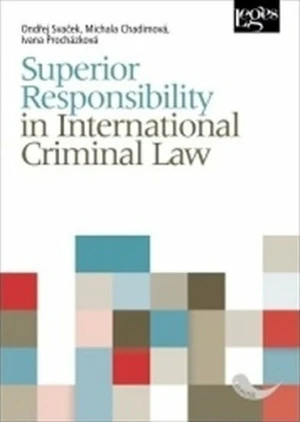The book analyzes traditional form of responsibility applicable in proceedings before the international criminal courts and tribunals according to which commander/superior is held responsible for failure to prevent or repress crimes under international law committed by his/her subordinates.In chronological order, the book addresses controversial origins of this doctrine and relevant case-law adopted until recently before the ad hoc tribunals, the International Criminal Court and some hybrid tribunals (mostly the ECCC). The book focuses both on material and procedural aspects of the doctrine. The procedural aspects are analyzed in relation to legal framework applicable before the ICC. The book elaborates on closely watched Regulation 55 which permits change in legal characterization of fact
s to accord with crimes in the subject-matter jurisdiction of the Court, or with the form of responsibility envisaged in the Statute. The book explores the consistency of this rule with statutory provisions concerning prosecutorial independence and the accused person's right to fair trial and contributes to better understanding between different forms of responsibility (Article 25 and Article 28 of the ICC Statute) and different subcategories of the superior responsibility itself.Finally, the book addresses various standards of proof envisaged in the text of the Rome Statute. The aim of the last chapter is to find out, what exactly is covered by these standards in relation to the doctrine of superior responsibility and what exactly the Prosecutor has to establish in various stages of the proceedings before the ICC.The book is proposed to serve both to scholars and practitioners in area of international (criminal) law.
více
Nejlevnější produkt
12,81 € | Knihy Dobrovsky | In stock
Máte ve vašem obchodě lepší produkt?
Nejlevnější produkt
12,81 € | Knihy Dobrovsky | In stock
Máte ve vašem obchodě lepší produkt?
K dispozici v
Co říkají obchody
Knihy Dobrovsky
The book analyzes traditional form of responsibility applicable in proceedings before the international criminal courts and tribunals according to which commander/superior is held responsible for failure to prevent or repress crimes under international law committed by his/her subordinates. In chronological order, the book addresses controversial origins of this doctrine and relevant case-law adopted until recently before the ad hoc tribunals, the International Criminal Court and some hybrid tribunals (mostly the ECCC). The book focuses both on material and procedural aspects of the doctrine. The procedural aspects are analyzed in relation to legal framework applicable before the ICC. The book elaborates on closely watched Regulation 55 which permits change in legal characterization of facts to accord with crimes in the subject-matter jurisdiction of the Court, or with the form of responsibility envisaged in the Statute. The book explores the consistency of this rule with statutory provisions concerning prosecutorial independence and the accused person's right to fair trial and contributes to better understanding between different forms of responsibility (Article 25 and Article 28 of the ICC Statute) and different subcategories of the superior responsibility itself. Finally, the book addresses various standards of proof envisaged in the text of the Rome Statute. The aim of the last chapter is to find out, what exactly is covered by these standards in relation to the doctrine of superior responsibility and what exactly the Prosecutor has to establish in various stages of the proceedings before the ICC. The book is proposed to serve both to scholars and practitioners in area of international (criminal) law.
knihy.abz.cz
Kniha: Superior Responsibility in International Criminal Law; Autor: Ondřej, Michala Chadimová, Svaček Procházková Ivana; The book analyzes traditional form of responsibility applicable in proceedings before the international criminal courts and tribunals according to which commander/superior is held responsible for failure to prevent or repress crimes under ...


